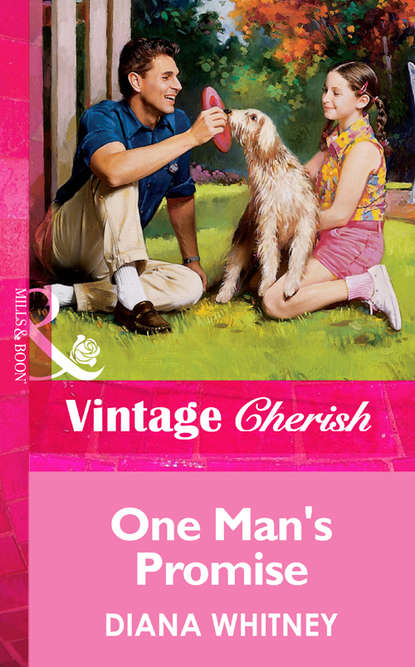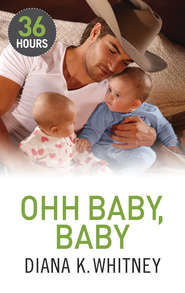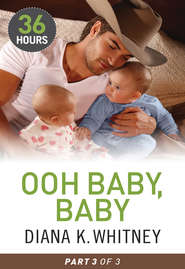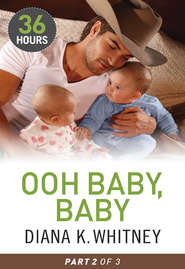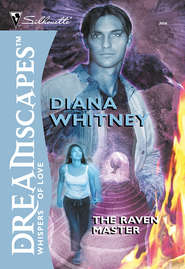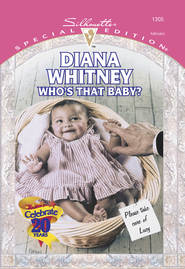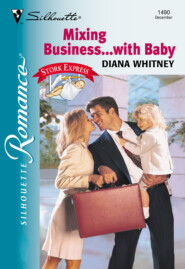По всем вопросам обращайтесь на: info@litportal.ru
(©) 2003-2024.
✖
One Man's Promise
Автор
Год написания книги
2018
Настройки чтения
Размер шрифта
Высота строк
Поля
Frustrated, Bobbi straightened her glasses, heaved a deflating sigh. “Look, I have to go. The magazine is sending me out to interview an over-the-hill jockey who’s accusing some racing association of age discrimination.”
CJ. nodded without comment, took a bite of sandwich while her roommate hustled around the cluttered room gathering her briefcase, pocket recorder, camera and other tools of the journalistic trade.
Pausing at the front door, Bobbi shouldered the briefcase strap, raked red-tipped fingers through her thick tangle of long black hair and regarded her friend with blatant concern. “Are you going to be all right, Ceejz? I can reschedule this thing—”
“I’m fine,” C.J. assured her. “You go, do your job.” She enforced that edict with the brightest smile she could muster, and tipped the orange juice glass in salute. “Knock ’em dead, tiger.”
Bobbi responded with a thin nod, an even thinner smile, then slipped out the door.
Alone now, C.J. slumped against the kitchen counter, forcing herself to finish the tasteless sandwich. Eating was more ritual than pleasure. Her body required food whether she wanted it or not. At the moment, her stomach twisted, her head hurt and she was angry with herself for being so emotional.
The reunion with her beloved pet had been bittersweet. Although deeply grateful that Rags was alive and happy, the emptiness in her heart seemed suddenly overwhelming again. For the past six years that crafty canine had been her constant companion, from romps on the ski slope to ocean surfing excursions, and had even shared a hot-air balloon trip she and Bobbi had taken to research one of her roommate’s magazine articles.
Rags was the only creature on earth who accepted C.J.’s quirks without question. He never criticized, never furrowed a doggy brow with worry, never gave scolded warnings or repeated medication reminders. He was thirty fur-covered pounds of unconditional love and acceptance that C.J. desperately needed.
But little Lissa needed it more.
The Matthews child had put a mirror to C.J.’s own lonely childhood, a poignant reminder of how much a friend—even a shaggy canine friend—means to a sick and lonely little girl.
Since C.J. wouldn‘t—couldn’t—take that away, she set about fulfilling her promise to forward Rags’s possessions. Retrieving a box from her bedroom closet, she examined the contents. Tiny tags, still snugged on Rags’s collar ring; his old training collar and leash; special ointment for the skin condition that flared occasionally, along with a folder of medical records, all meticulously maintained from the day she’d brought him home as a feisty ten-week-old pup; his favorite chew toys, the plastic Frisbee he adored; a tiny wet suit for beach excursions, a warm saddle coat for snow trips; and of course, his beloved skateboard.
There were photographs, too, a record of their time together, of the adventures they’d shared. But the pictures were hers, and hers alone. All she had left were those images, and the memories they evoked. Good memories. Joyful memories.
Memories of mountain hikes and walks in the park, of the reassuring bed lump that always crowded her legs, of the rushed vet visit when a wasp had stung his tongue.
Memories of warm fur and a cold nose and wet, doggy kisses that made her sputter and laugh. Memories of friendship. Memories of love.
C.J. remembered it all, relived it all. And she smiled through her tears, content in the knowledge that there would be more memories of friendship and love created between a big-hearted pooch and the lonely little girl who needed him.
Chapter Two
“I can have the revisions done by the end of the week.” Shifting the telephone, Richard spread the curled blueprint over his drafting table, readjusted the corner tape to hold it flat. “The changes you’re suggesting shouldn’t have more than a minimal impact on cost—”
“Daddy!”
“But I’ll run the new specs through the computer and give you an update—”
“Daa-ddy!”
“In a day or so.” Richard sighed as Lissa stomped into the secluded den that served as his architectural office. “Listen, Jay, can I get back to you on this? Thanks.”
“Ragsy won’t play with me,” Lissa announced as soon as he’d cradled the receiver. “He won’t play dress-up or chase his ball or do anything ’cept sit on the back of Gramps’s chair with that dumb Frisbee in his mouth and look out the window.”
Richard swiveled on his drafting stool, and squeezed the back of his aching neck. As he opened his mouth to speak, one of a half-dozen antique clocks displayed throughout the office began to chime the half hour. Seconds later another chimed in, then another. The sound soothed Richard, offered a moment of calm retreat. He loved clocks, particularly the old ones, with rich embellishments, gilded etchings and intricate carvings crafted by long-ago artists who took pride in their work. His collection of such treasures was a source of great joy to him, and he could spend hours restoring a neglected piece to its original luster.
After a few seconds, the clocks fell silent, and Richard returned his attention to the sulking child beside his drafting stool. His voice was firm, but not particularly convincing. “Lissa, you know you’re not supposed to interrupt me while I’m working.”
She poked her lip out, folded her arms. “I want to play with Rags.”
Heaving a frustrated sigh, Richard motioned his daughter over, pulled her into his lap. “Rags doesn’t want to play right now, punkin. He’s feeling sad.”
Lissa’s lip quivered, then clamped in anger. “It’s that mean lady’s fault. Gramps even said so.”
With some effort, Richard kept an impassive expression. Thompson McCade was rich, powerful, smoothly controlling and as devoted to his grandchild as was the man’s timid, beleaguered wife. Richard considered his father-in-law a tyrannical bully, but had always kept that opinion to himself out of respect for his wife’s memory, and because he didn’t want to alienate Lissa from her grandparents’ love and attention.
Now, as always, Richard tried to straddle a fine line between supporting McCade’s inappropriate blame-mongering, and openly contradicting his daughter’s beloved Gramps. “I can understand your grandfather’s concern, punkin. He hates to see you upset. But you have to remember that Gramps hasn’t met Ms. Moray, so he’s really not in a position to comment on her motives. I believe she only wants what’s best for Rags, and for you, too.”
“I don’t care. I hate her.”
“That’s not a nice thing to say.”
“Well, I do hate her, I do. She’s trying to steal my dog and I just wish she’d dry up and die.”
“That’s enough.” Speaking sternly enough to startle his daughter into attention, Richard enforced his position. “It’s okay for you to feel bad, and it’s okay for you to be angry, but it’s not okay for you to say mean things about people even when they’re not around to hear them.”
“But it’s not fair,” Lissa wailed. “Ragsy is my dog.” Pulling away from her father’s embrace, the child leapt down, kicked at a cardboard blueprint tube lying beside the drafting table. “He was real happy before she showed up, and now he won’t eat or play or do anything at all. He’s no fun anymore, and it’s all her fault.”
After emphasizing her pique with another kick at the hapless mailing tube, Lissa spun on her heel and marched out. A moment later, her bedroom door slammed.
Richard pushed away the contract file with which he’d been working, leaned back on his stool and rubbed his eyelids until they stung. As annoyed as he was with his father-in-law’s interference, he still couldn’t blame Lissa for feeling helpless and frustrated, particularly when he felt that way himself.
Ever since C. J. Moray’s less than fortuitous appearance, Rags had shown every symptom of an animal grieving himself sick. The poor little dog had eaten nothing for four days now, and even the neatly packed box of toys, bowls and other doggy belongings that had mysteriously arrived on the front porch hadn’t helped dissuade the animal’s melancholy mood. If anything, the pooch seemed even sadder, carrying the pathetic Frisbee in his mouth as he wandered from room to room, then returned to his vigil at the front window and stared dolefully outside as if awaiting his mistress’s return.
Yesterday Richard had decided a romp in the neighborhood park would perk Rags up. The moment the front door opened, the dog had shot to the very spot in the front yard where C. J. Moray had been standing, then followed her scent to the curb. Had the animal not been leashed, there was no doubt in Richard’s mind that Rags would have chased the scent as far as possible in pursuit of the mistress he had never forgotten, and still clearly adored.
Rags was obviously heartbroken. Richard feared the stoic little pooch would grieve himself to death, and was convinced that something had to be done. He’d already formulated a plan. Lissa wouldn’t like it, of course.
But she’d like the alternative even less.
The dance studio was situated in a tidy corner of a bustling strip mall, the kind where neighborhood residents gathered for groceries, a quick video rental, or to peruse the aisles of a local bookstore. Richard parked, paused outside the studio’s glass front to read a few posted flyers announcing beginning ballet lessons, tap dance classes and the like.
He swallowed a guilty twinge. Lissa had always wanted to take ballet lessons. The request had been denied, as had her desire to participate in playground softball and other such athletic endeavors, because Richard was worried such physical exertion would exacerbate her asthma.
Lissa’s asthma was no joke. She’d nearly died twice, and had been hospitalized more times than Richard could count. Doctors hoped the condition would ease as she matured, but so far there’d been no perceptible improvement. Attacks came on suddenly, without warning, and could escalate to life-threatening proportions with hideous speed. It was a terrifying situation, not for the faint of heart.
Lissa’s mother hadn’t been able to deal with the terror, the helpless horror of watching her only child slip to the edge of death time and time and time again. Richard had understood his wife’s fear. He’d even understood her guilt, and the secret sense of failure at having given birth to a frail and sickly child. What Richard hadn’t understood, still couldn’t understand, was why a mother, any mother, would give up on her own child by giving up on herself.
Despite years of emotional withdrawal during which Richard and his wife had become virtual strangers, he’d been nonetheless shattered by her death.
Now he gazed into the glass window, his own reflection revealing the bitterness of that memory. It hurt. It would always hurt. He’d failed as a husband. He was determined not to fail as a father.
Squaring his shoulders, he yanked open the dancestudio door and walked into chaos.
Beyond the partitioned entry, blaring music vibrated the walls, the floor and his back molars. Bongos bonged, cymbals crashed, tambourines tonated in a wild calypso cantata that was part Caribbean reggae and part “Dance of the Sugar Plum Fairies,” with a jarring jab of New Orleans jazz tossed in for good measure.
Richard would have hocked everything he owned for a sturdy set of earplugs.
Above the deafening musical fray was a voice, sharp, firm and familiar. “And one and two... twirl, twirl... hands high, Shelly, reach for the sky...that’s good, very good. And bend, twist, and bend and twist... come on, fairies, high on your toes, stretch those arms...fluid, graceful, hands flutter like fairy wings.”





